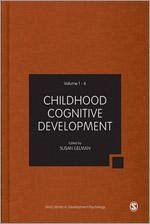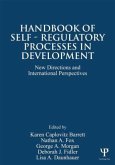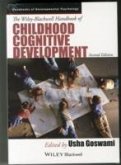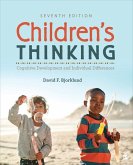Childhood Cognitive Development
Herausgeber: Gelman, Susan A
Childhood Cognitive Development
Herausgeber: Gelman, Susan A
- Broschiertes Buch
- Merkliste
- Auf die Merkliste
- Bewerten Bewerten
- Teilen
- Produkt teilen
- Produkterinnerung
- Produkterinnerung
The field of cognitive development is an exciting one that has undergone a revolution in the past generation, with a wealth of new findings, methods and theoretical ideas that transform our understanding of children's thinking. This new SAGE Major Work presents a collection of important papers - both classic and contemporary - that cover key contributions in the area of cognitive development in children, designed to be a touchstone text for scholars, practitioners and educators with an interest in children's thinking. Although the primary focus is on basic scientific research, each volume also…mehr
Andere Kunden interessierten sich auch für
![Handbook of Self-Regulatory Processes in Development Handbook of Self-Regulatory Processes in Development]() Handbook of Self-Regulatory Processes in Development161,99 €
Handbook of Self-Regulatory Processes in Development161,99 €![The Wiley-Blackwell Handbook of Childhood Cognitive Development 2e and Developmental Cognitive Neuroscience 4e The Wiley-Blackwell Handbook of Childhood Cognitive Development 2e and Developmental Cognitive Neuroscience 4e]() Usha GoswamiThe Wiley-Blackwell Handbook of Childhood Cognitive Development 2e and Developmental Cognitive Neuroscience 4e76,99 €
Usha GoswamiThe Wiley-Blackwell Handbook of Childhood Cognitive Development 2e and Developmental Cognitive Neuroscience 4e76,99 €![Cognitive Development Cognitive Development]() Kathleen M GalottiCognitive Development188,99 €
Kathleen M GalottiCognitive Development188,99 €![Children′s Thinking Children′s Thinking]() David F BjorklundChildren′s Thinking158,99 €
David F BjorklundChildren′s Thinking158,99 €![The Anxious Generation The Anxious Generation]() Jonathan HaidtThe Anxious Generation10,99 €
Jonathan HaidtThe Anxious Generation10,99 €![Adult Survivors Understanding the Long-Term Effects of Traumatic Childhood Experiences Adult Survivors Understanding the Long-Term Effects of Traumatic Childhood Experiences]() John RangeAdult Survivors Understanding the Long-Term Effects of Traumatic Childhood Experiences12,99 €
John RangeAdult Survivors Understanding the Long-Term Effects of Traumatic Childhood Experiences12,99 €![Resolving Childhood Trauma Resolving Childhood Trauma]() Michele L. ValdezResolving Childhood Trauma13,99 €
Michele L. ValdezResolving Childhood Trauma13,99 €-
-
-
The field of cognitive development is an exciting one that has undergone a revolution in the past generation, with a wealth of new findings, methods and theoretical ideas that transform our understanding of children's thinking. This new SAGE Major Work presents a collection of important papers - both classic and contemporary - that cover key contributions in the area of cognitive development in children, designed to be a touchstone text for scholars, practitioners and educators with an interest in children's thinking. Although the primary focus is on basic scientific research, each volume also discusses important applied issues, such as role of critical periods in perceptual development, or the implications of cognitive development for learning in academic contexts. Volume One: Basic Processes Volume Two: Concepts, Categories and Language Volume Three: Core Theories Volume Four: Reasoning, Problem-Solving and Academic Skills Volume Five: Context and Culture
Hinweis: Dieser Artikel kann nur an eine deutsche Lieferadresse ausgeliefert werden.
Hinweis: Dieser Artikel kann nur an eine deutsche Lieferadresse ausgeliefert werden.
Produktdetails
- Produktdetails
- Verlag: Sage Publications
- Five-Volume Set edition
- Seitenzahl: 1700
- Erscheinungstermin: 11. Februar 2014
- Englisch
- Abmessung: 251mm x 170mm x 147mm
- Gewicht: 3266g
- ISBN-13: 9781446272459
- ISBN-10: 1446272451
- Artikelnr.: 40556191
- Herstellerkennzeichnung
- Libri GmbH
- Europaallee 1
- 36244 Bad Hersfeld
- gpsr@libri.de
- Verlag: Sage Publications
- Five-Volume Set edition
- Seitenzahl: 1700
- Erscheinungstermin: 11. Februar 2014
- Englisch
- Abmessung: 251mm x 170mm x 147mm
- Gewicht: 3266g
- ISBN-13: 9781446272459
- ISBN-10: 1446272451
- Artikelnr.: 40556191
- Herstellerkennzeichnung
- Libri GmbH
- Europaallee 1
- 36244 Bad Hersfeld
- gpsr@libri.de
Susan Gelman is the Heinz Werner Collegiate Professor of Psychology at the University of Michigan. Her research focuses on concept and language development in young children. She is the author of The Essential Child (Oxford University Press, 2003) and over 100 other scholarly publications. She is an elected Fellow of the National Academy of Sciences and the American Academy of Arts and Sciences and Past President of the Cognitive Development Society, and has received numerous awards, including a J. S. Guggenheim Fellowship, a James McKeen Cattell Fund sabbatical fellowship, and the APA Distinguished Scientific Award for Early Career Contribution to Psychology in the Developmental Area.
VOLUME ONE: BASIC PROCESSES Piaget
s Theory - Jean Piaget Perceptual Learning in Development: Some Basic Concepts - Eleanor Gibson Initial Knowledge: Six Suggestions - Elizabeth Spelke Epigenetics and the Biological Definition of Gene X Environment Interactions - Michael Meaney Imitation of Facial and Manual Gestures by Human Neonates - Andrew Meltzoff and M. Keith Moore Visual Perception in the Newborn Infant: Issues and Debates - Alan Slater Superior Detection of Threat-Relevant Stimuli in Infancy - Vanessa LoBue and Judy DeLoache Action Experience Alters 3-Month-Old Infants
Perception of Others
Actions - Jessica Sommerville, Amanda Woodward and Amy Needham The Other-Race Effect Develops during Infancy: Evidence of Perceptual Narrowing - David Kelly et al. Constructing a Past in Infancy: A Neuro-Developmental Account - Patricia Bauer Believing is Seeing: How Rumors Can Engender False Memories in Preschoolers - Gabrielle Principe et al. Mother-Child Conversations about the Past: Relationships of Style and Memory over Time - Elaine Reese, Catherine Haden and Robyn Fivush Developmental Change in Speed of Processing during Childhood and Adolescence - Robert Kail An Age-Related Dissociation Between Knowing Rules and Using Them - Philip David Zelazo, Douglas Frye and Tanja Rapus Preschool Program Improves Cognitive Control - Adele Diamond Developing Human Brain Functions - Mark Johnson Beyond What Develops When: Neuroimaging May Inform How Cognition Changes with Development - Dima Amso and B.Casey The Adolescent Brain - B. Casey, Sarah Getz and Adriana Galvan VOLUME TWO: CONCEPTS, CATEGORIES, AND LANGUAGE Possible Stages in the Evolution of the Language Capacity - Ray Jackendoff Children Creating Core Properties of Language: Evidence from an Emerging Sign Language in Nicaragua - Ann Senghas et al. Cross-Language Speech Perception: Evidence for Perceptual Reorganization during the First Year of Life - Janet Werker and Richard Tees Statistical Learning in 8-Month-Old Infants - Jenny Saffran, Richard Aslin and Elissa Newport Word Learning as Bayesian Inference - Fei Xu and Joshua Tenenbaum Do Words Facilitate Object Categorization in 9-Month-Old Infants? - Marie Balaban and Sandra Waxman Can Language Restructure Cognition? The Case for Space - Asifa Majid et al. Numerical Cognition without Words: Evidence from Amazonia - Peter Gordon The Importance of Shape in Early Lexical Learning - Barbara Landau, Linda Smith and Susan Jones Infants
Ability To Draw Inferences about Nonobvious Object Properties: Evidence from Exploratory Play - Dare Baldwin, Ellen Markman and Riikka Melartin Detecting Blickets: How Young Children Use Information about Novel Causal Powers in Categorization and Induction - Alison Gopnik and David Sobel Conceptual Influences on Category-Based Induction - Susan Gelman and Natalie Davidson Psychological Essentialism in Children - Susan Gelman Thinking in Categories Or Along a Continuum: Consequences for Children's Social Judgments - Allison Master, Ellen Markman and Carol Dweck Cultural Transmission of Social Essentialism - Marjorie Rhodes, Sarah-Jane Leslie and Christina Tworek VOLUME THREE: CORE THEORIES First Principles Organize Attention To and Learning about Relevant Data: Number and the Animate-Inanimate Distinction as Examples - Rochel Gelman Mechanisms of Theory Formation in Young Children - Alison Gopnik and Laura Schulz Précis of The Origin of Concepts - Susan Carey The Microgenetic Method: A Direct Means for Studying Cognitive Development - Robert Siegler and Kevin Crowley Object Permanence in 3
- and 4
-Month-Old Infants - Renée Baillargeon Rapid Change in the Symbolic Functioning of Very Young Children - Judy DeLoache Arrows of Time in Early Childhood - William Friedman Young Children
s Conception of the Biological World - Kayoko Inagaki and Giyoo Hatano Folkbiology Meets Microbiology: A Study of Conceptual and Behavioral Change - Terry Kit-fong Au et al. Are Children
Intuitive Theists
? Reasoning about Purpose and Design in Nature - Deborah Kelemen Developing a Theory of Mind - Henry Wellman Baillargeon Do 15-Month-Old Infants Understand False Beliefs? - Kristine Onishi et al. You Can
t Always Get What You Want: Infants Understand Failed Goal-Directed Actions - Amanda Brandone and Henry Wellman Spontaneous Theory of Mind and its Absence in Autism Spectrum Disorders - Atsushi Senju Social Evaluation in Preverbal Infants - J.Kiley Hamlin, Karen Wynn and Paul Bloom Accent Trumps Race in Guiding Children
s Social Preferences - Katherine Kinzler, Kristin Shutts, Jasmine Dejesus and Elizabeth Spelke VOLUME FOUR: REASONING, PROBLEM-SOLVING, AND ACADEMIC SKILLS Development and Learning - Jean Piaget Problem Solving in Infancy: The Emergence of an Action Plan - Michael McCarty, Rachel Clifton and Roberta Collard Bootstrapping the Mind: Analogical Processes and Symbol Systems - Dedre Gentner Core Systems of Number - Lisa Feigenson, Stanislas Dehaene and Elizabeth Spelke Individual Differences in Non-Verbal Number Acuity Correlate with Maths Achievement - Justin Halberda, Michèle Mazzocco, Lisa Feigenson Mathematics Teaching in the United States Today (And Tomorrow): Results from the TIMSS 1999 Video Study - James Hiebert et al. Indexing Transitional Knowledge - Theresa Graham and Michelle Perry Literacy Growth in the Academic Year Versus Summer from Preschool Through Second Grade: Differential Effects of Schooling Across Four Skills - Lori Skibbe Cross-Cultural Similarities in the Predictors of Reading Acquisition - Catherine McBride-Chang, and Robert Kail The Relation Between Essentialist Beliefs and Evolutionary Reasoning - Andrew Shtulman and Laura Schulz Stereotype Susceptibility in Children: Effects of Identity Activation on Quantitative Performance - Nalini Ambady et al. Preschoolers
Responses to Social Comparisons Involving Relative Failure - Marjorie Rhodes and Daniel Brickman Praise for Intelligence Can Undermine Children
s Motivation and Performance - Claudia Mueller and Carol Dweck Subtle Linguistic Cues Affect Children
s Motivation - Andrei Cimpian Scientific and Pragmatic Challenges for Bridging Education and Neuroscience - Sashank Varma, Bruce McCandliss and Daniel Schwartz VOLUME FIVE: CONTEXT AND CULTURE Extracts from The Cultural Origins of Human Cognition. - Michael Tomasello Does the Chimpanzee Have a Theory of Mind? 30 Years Later - Josep Call and Michael Tomasello Economic Cognition in Humans and Animals: The Search for Core Mechanisms - Laurie Santos and Kelly Hughes Cognitive Development in Chimpanzees: A Trade-Off Between Memory and Abstraction? - Tetsuro Matsuzawa Trust in Testimony: How Children Learn about Science and Religion - Paul Harris and Melissa Koenig The Hidden Structure of Overimitation - Derek Lyons, Andrew Young and Frank Keil Natural Pedagogy - Gergely Csibra and Gyorgy Gergely The Double-Edged Sword of Pedagogy: Instruction Limits Spontaneous Exploration and Discovery - Elizabeth Bonawitz et al. Weaving Together Culture and Cognition: An Illustration from Madagascar - Rita Astuti The Coexistence of Natural and Supernatural Explanations Across Cultures and Development - Cristine Legare et al. Mexican-Heritage Children
s Attention and Learning from Interactions Directed To Others - Katie Silva, Maricela Correa-Chávez and Barbara Rogoff A Developmental Examination of the Conceptual Structure of Animal, Artifact, and Human Social Categories Across Two Cultural Contexts - Marjorie Rhodes and Susan Gelman Parents Explain More Often to Boys Than to Girls during Shared Scientific Thinking - Kevin Crowley et al. Relations Between Temperament and Theory of Mind Development in the United States and China: Biological and Behavioral Correlates of Preschoolers
False-Belief Understanding - Jonathan Lane et al. The Relation Between Individual Differences in Fantasy and Theory of Mind - Marjorie Taylor and Stephanie Carlson A Visit from the Candy Witch: Children's Belief in a Novel Fantastical Entity - Jacqueline Woolley et al.
s Theory - Jean Piaget Perceptual Learning in Development: Some Basic Concepts - Eleanor Gibson Initial Knowledge: Six Suggestions - Elizabeth Spelke Epigenetics and the Biological Definition of Gene X Environment Interactions - Michael Meaney Imitation of Facial and Manual Gestures by Human Neonates - Andrew Meltzoff and M. Keith Moore Visual Perception in the Newborn Infant: Issues and Debates - Alan Slater Superior Detection of Threat-Relevant Stimuli in Infancy - Vanessa LoBue and Judy DeLoache Action Experience Alters 3-Month-Old Infants
Perception of Others
Actions - Jessica Sommerville, Amanda Woodward and Amy Needham The Other-Race Effect Develops during Infancy: Evidence of Perceptual Narrowing - David Kelly et al. Constructing a Past in Infancy: A Neuro-Developmental Account - Patricia Bauer Believing is Seeing: How Rumors Can Engender False Memories in Preschoolers - Gabrielle Principe et al. Mother-Child Conversations about the Past: Relationships of Style and Memory over Time - Elaine Reese, Catherine Haden and Robyn Fivush Developmental Change in Speed of Processing during Childhood and Adolescence - Robert Kail An Age-Related Dissociation Between Knowing Rules and Using Them - Philip David Zelazo, Douglas Frye and Tanja Rapus Preschool Program Improves Cognitive Control - Adele Diamond Developing Human Brain Functions - Mark Johnson Beyond What Develops When: Neuroimaging May Inform How Cognition Changes with Development - Dima Amso and B.Casey The Adolescent Brain - B. Casey, Sarah Getz and Adriana Galvan VOLUME TWO: CONCEPTS, CATEGORIES, AND LANGUAGE Possible Stages in the Evolution of the Language Capacity - Ray Jackendoff Children Creating Core Properties of Language: Evidence from an Emerging Sign Language in Nicaragua - Ann Senghas et al. Cross-Language Speech Perception: Evidence for Perceptual Reorganization during the First Year of Life - Janet Werker and Richard Tees Statistical Learning in 8-Month-Old Infants - Jenny Saffran, Richard Aslin and Elissa Newport Word Learning as Bayesian Inference - Fei Xu and Joshua Tenenbaum Do Words Facilitate Object Categorization in 9-Month-Old Infants? - Marie Balaban and Sandra Waxman Can Language Restructure Cognition? The Case for Space - Asifa Majid et al. Numerical Cognition without Words: Evidence from Amazonia - Peter Gordon The Importance of Shape in Early Lexical Learning - Barbara Landau, Linda Smith and Susan Jones Infants
Ability To Draw Inferences about Nonobvious Object Properties: Evidence from Exploratory Play - Dare Baldwin, Ellen Markman and Riikka Melartin Detecting Blickets: How Young Children Use Information about Novel Causal Powers in Categorization and Induction - Alison Gopnik and David Sobel Conceptual Influences on Category-Based Induction - Susan Gelman and Natalie Davidson Psychological Essentialism in Children - Susan Gelman Thinking in Categories Or Along a Continuum: Consequences for Children's Social Judgments - Allison Master, Ellen Markman and Carol Dweck Cultural Transmission of Social Essentialism - Marjorie Rhodes, Sarah-Jane Leslie and Christina Tworek VOLUME THREE: CORE THEORIES First Principles Organize Attention To and Learning about Relevant Data: Number and the Animate-Inanimate Distinction as Examples - Rochel Gelman Mechanisms of Theory Formation in Young Children - Alison Gopnik and Laura Schulz Précis of The Origin of Concepts - Susan Carey The Microgenetic Method: A Direct Means for Studying Cognitive Development - Robert Siegler and Kevin Crowley Object Permanence in 3
- and 4
-Month-Old Infants - Renée Baillargeon Rapid Change in the Symbolic Functioning of Very Young Children - Judy DeLoache Arrows of Time in Early Childhood - William Friedman Young Children
s Conception of the Biological World - Kayoko Inagaki and Giyoo Hatano Folkbiology Meets Microbiology: A Study of Conceptual and Behavioral Change - Terry Kit-fong Au et al. Are Children
Intuitive Theists
? Reasoning about Purpose and Design in Nature - Deborah Kelemen Developing a Theory of Mind - Henry Wellman Baillargeon Do 15-Month-Old Infants Understand False Beliefs? - Kristine Onishi et al. You Can
t Always Get What You Want: Infants Understand Failed Goal-Directed Actions - Amanda Brandone and Henry Wellman Spontaneous Theory of Mind and its Absence in Autism Spectrum Disorders - Atsushi Senju Social Evaluation in Preverbal Infants - J.Kiley Hamlin, Karen Wynn and Paul Bloom Accent Trumps Race in Guiding Children
s Social Preferences - Katherine Kinzler, Kristin Shutts, Jasmine Dejesus and Elizabeth Spelke VOLUME FOUR: REASONING, PROBLEM-SOLVING, AND ACADEMIC SKILLS Development and Learning - Jean Piaget Problem Solving in Infancy: The Emergence of an Action Plan - Michael McCarty, Rachel Clifton and Roberta Collard Bootstrapping the Mind: Analogical Processes and Symbol Systems - Dedre Gentner Core Systems of Number - Lisa Feigenson, Stanislas Dehaene and Elizabeth Spelke Individual Differences in Non-Verbal Number Acuity Correlate with Maths Achievement - Justin Halberda, Michèle Mazzocco, Lisa Feigenson Mathematics Teaching in the United States Today (And Tomorrow): Results from the TIMSS 1999 Video Study - James Hiebert et al. Indexing Transitional Knowledge - Theresa Graham and Michelle Perry Literacy Growth in the Academic Year Versus Summer from Preschool Through Second Grade: Differential Effects of Schooling Across Four Skills - Lori Skibbe Cross-Cultural Similarities in the Predictors of Reading Acquisition - Catherine McBride-Chang, and Robert Kail The Relation Between Essentialist Beliefs and Evolutionary Reasoning - Andrew Shtulman and Laura Schulz Stereotype Susceptibility in Children: Effects of Identity Activation on Quantitative Performance - Nalini Ambady et al. Preschoolers
Responses to Social Comparisons Involving Relative Failure - Marjorie Rhodes and Daniel Brickman Praise for Intelligence Can Undermine Children
s Motivation and Performance - Claudia Mueller and Carol Dweck Subtle Linguistic Cues Affect Children
s Motivation - Andrei Cimpian Scientific and Pragmatic Challenges for Bridging Education and Neuroscience - Sashank Varma, Bruce McCandliss and Daniel Schwartz VOLUME FIVE: CONTEXT AND CULTURE Extracts from The Cultural Origins of Human Cognition. - Michael Tomasello Does the Chimpanzee Have a Theory of Mind? 30 Years Later - Josep Call and Michael Tomasello Economic Cognition in Humans and Animals: The Search for Core Mechanisms - Laurie Santos and Kelly Hughes Cognitive Development in Chimpanzees: A Trade-Off Between Memory and Abstraction? - Tetsuro Matsuzawa Trust in Testimony: How Children Learn about Science and Religion - Paul Harris and Melissa Koenig The Hidden Structure of Overimitation - Derek Lyons, Andrew Young and Frank Keil Natural Pedagogy - Gergely Csibra and Gyorgy Gergely The Double-Edged Sword of Pedagogy: Instruction Limits Spontaneous Exploration and Discovery - Elizabeth Bonawitz et al. Weaving Together Culture and Cognition: An Illustration from Madagascar - Rita Astuti The Coexistence of Natural and Supernatural Explanations Across Cultures and Development - Cristine Legare et al. Mexican-Heritage Children
s Attention and Learning from Interactions Directed To Others - Katie Silva, Maricela Correa-Chávez and Barbara Rogoff A Developmental Examination of the Conceptual Structure of Animal, Artifact, and Human Social Categories Across Two Cultural Contexts - Marjorie Rhodes and Susan Gelman Parents Explain More Often to Boys Than to Girls during Shared Scientific Thinking - Kevin Crowley et al. Relations Between Temperament and Theory of Mind Development in the United States and China: Biological and Behavioral Correlates of Preschoolers
False-Belief Understanding - Jonathan Lane et al. The Relation Between Individual Differences in Fantasy and Theory of Mind - Marjorie Taylor and Stephanie Carlson A Visit from the Candy Witch: Children's Belief in a Novel Fantastical Entity - Jacqueline Woolley et al.
VOLUME ONE: BASIC PROCESSES Piaget
s Theory - Jean Piaget Perceptual Learning in Development: Some Basic Concepts - Eleanor Gibson Initial Knowledge: Six Suggestions - Elizabeth Spelke Epigenetics and the Biological Definition of Gene X Environment Interactions - Michael Meaney Imitation of Facial and Manual Gestures by Human Neonates - Andrew Meltzoff and M. Keith Moore Visual Perception in the Newborn Infant: Issues and Debates - Alan Slater Superior Detection of Threat-Relevant Stimuli in Infancy - Vanessa LoBue and Judy DeLoache Action Experience Alters 3-Month-Old Infants
Perception of Others
Actions - Jessica Sommerville, Amanda Woodward and Amy Needham The Other-Race Effect Develops during Infancy: Evidence of Perceptual Narrowing - David Kelly et al. Constructing a Past in Infancy: A Neuro-Developmental Account - Patricia Bauer Believing is Seeing: How Rumors Can Engender False Memories in Preschoolers - Gabrielle Principe et al. Mother-Child Conversations about the Past: Relationships of Style and Memory over Time - Elaine Reese, Catherine Haden and Robyn Fivush Developmental Change in Speed of Processing during Childhood and Adolescence - Robert Kail An Age-Related Dissociation Between Knowing Rules and Using Them - Philip David Zelazo, Douglas Frye and Tanja Rapus Preschool Program Improves Cognitive Control - Adele Diamond Developing Human Brain Functions - Mark Johnson Beyond What Develops When: Neuroimaging May Inform How Cognition Changes with Development - Dima Amso and B.Casey The Adolescent Brain - B. Casey, Sarah Getz and Adriana Galvan VOLUME TWO: CONCEPTS, CATEGORIES, AND LANGUAGE Possible Stages in the Evolution of the Language Capacity - Ray Jackendoff Children Creating Core Properties of Language: Evidence from an Emerging Sign Language in Nicaragua - Ann Senghas et al. Cross-Language Speech Perception: Evidence for Perceptual Reorganization during the First Year of Life - Janet Werker and Richard Tees Statistical Learning in 8-Month-Old Infants - Jenny Saffran, Richard Aslin and Elissa Newport Word Learning as Bayesian Inference - Fei Xu and Joshua Tenenbaum Do Words Facilitate Object Categorization in 9-Month-Old Infants? - Marie Balaban and Sandra Waxman Can Language Restructure Cognition? The Case for Space - Asifa Majid et al. Numerical Cognition without Words: Evidence from Amazonia - Peter Gordon The Importance of Shape in Early Lexical Learning - Barbara Landau, Linda Smith and Susan Jones Infants
Ability To Draw Inferences about Nonobvious Object Properties: Evidence from Exploratory Play - Dare Baldwin, Ellen Markman and Riikka Melartin Detecting Blickets: How Young Children Use Information about Novel Causal Powers in Categorization and Induction - Alison Gopnik and David Sobel Conceptual Influences on Category-Based Induction - Susan Gelman and Natalie Davidson Psychological Essentialism in Children - Susan Gelman Thinking in Categories Or Along a Continuum: Consequences for Children's Social Judgments - Allison Master, Ellen Markman and Carol Dweck Cultural Transmission of Social Essentialism - Marjorie Rhodes, Sarah-Jane Leslie and Christina Tworek VOLUME THREE: CORE THEORIES First Principles Organize Attention To and Learning about Relevant Data: Number and the Animate-Inanimate Distinction as Examples - Rochel Gelman Mechanisms of Theory Formation in Young Children - Alison Gopnik and Laura Schulz Précis of The Origin of Concepts - Susan Carey The Microgenetic Method: A Direct Means for Studying Cognitive Development - Robert Siegler and Kevin Crowley Object Permanence in 3
- and 4
-Month-Old Infants - Renée Baillargeon Rapid Change in the Symbolic Functioning of Very Young Children - Judy DeLoache Arrows of Time in Early Childhood - William Friedman Young Children
s Conception of the Biological World - Kayoko Inagaki and Giyoo Hatano Folkbiology Meets Microbiology: A Study of Conceptual and Behavioral Change - Terry Kit-fong Au et al. Are Children
Intuitive Theists
? Reasoning about Purpose and Design in Nature - Deborah Kelemen Developing a Theory of Mind - Henry Wellman Baillargeon Do 15-Month-Old Infants Understand False Beliefs? - Kristine Onishi et al. You Can
t Always Get What You Want: Infants Understand Failed Goal-Directed Actions - Amanda Brandone and Henry Wellman Spontaneous Theory of Mind and its Absence in Autism Spectrum Disorders - Atsushi Senju Social Evaluation in Preverbal Infants - J.Kiley Hamlin, Karen Wynn and Paul Bloom Accent Trumps Race in Guiding Children
s Social Preferences - Katherine Kinzler, Kristin Shutts, Jasmine Dejesus and Elizabeth Spelke VOLUME FOUR: REASONING, PROBLEM-SOLVING, AND ACADEMIC SKILLS Development and Learning - Jean Piaget Problem Solving in Infancy: The Emergence of an Action Plan - Michael McCarty, Rachel Clifton and Roberta Collard Bootstrapping the Mind: Analogical Processes and Symbol Systems - Dedre Gentner Core Systems of Number - Lisa Feigenson, Stanislas Dehaene and Elizabeth Spelke Individual Differences in Non-Verbal Number Acuity Correlate with Maths Achievement - Justin Halberda, Michèle Mazzocco, Lisa Feigenson Mathematics Teaching in the United States Today (And Tomorrow): Results from the TIMSS 1999 Video Study - James Hiebert et al. Indexing Transitional Knowledge - Theresa Graham and Michelle Perry Literacy Growth in the Academic Year Versus Summer from Preschool Through Second Grade: Differential Effects of Schooling Across Four Skills - Lori Skibbe Cross-Cultural Similarities in the Predictors of Reading Acquisition - Catherine McBride-Chang, and Robert Kail The Relation Between Essentialist Beliefs and Evolutionary Reasoning - Andrew Shtulman and Laura Schulz Stereotype Susceptibility in Children: Effects of Identity Activation on Quantitative Performance - Nalini Ambady et al. Preschoolers
Responses to Social Comparisons Involving Relative Failure - Marjorie Rhodes and Daniel Brickman Praise for Intelligence Can Undermine Children
s Motivation and Performance - Claudia Mueller and Carol Dweck Subtle Linguistic Cues Affect Children
s Motivation - Andrei Cimpian Scientific and Pragmatic Challenges for Bridging Education and Neuroscience - Sashank Varma, Bruce McCandliss and Daniel Schwartz VOLUME FIVE: CONTEXT AND CULTURE Extracts from The Cultural Origins of Human Cognition. - Michael Tomasello Does the Chimpanzee Have a Theory of Mind? 30 Years Later - Josep Call and Michael Tomasello Economic Cognition in Humans and Animals: The Search for Core Mechanisms - Laurie Santos and Kelly Hughes Cognitive Development in Chimpanzees: A Trade-Off Between Memory and Abstraction? - Tetsuro Matsuzawa Trust in Testimony: How Children Learn about Science and Religion - Paul Harris and Melissa Koenig The Hidden Structure of Overimitation - Derek Lyons, Andrew Young and Frank Keil Natural Pedagogy - Gergely Csibra and Gyorgy Gergely The Double-Edged Sword of Pedagogy: Instruction Limits Spontaneous Exploration and Discovery - Elizabeth Bonawitz et al. Weaving Together Culture and Cognition: An Illustration from Madagascar - Rita Astuti The Coexistence of Natural and Supernatural Explanations Across Cultures and Development - Cristine Legare et al. Mexican-Heritage Children
s Attention and Learning from Interactions Directed To Others - Katie Silva, Maricela Correa-Chávez and Barbara Rogoff A Developmental Examination of the Conceptual Structure of Animal, Artifact, and Human Social Categories Across Two Cultural Contexts - Marjorie Rhodes and Susan Gelman Parents Explain More Often to Boys Than to Girls during Shared Scientific Thinking - Kevin Crowley et al. Relations Between Temperament and Theory of Mind Development in the United States and China: Biological and Behavioral Correlates of Preschoolers
False-Belief Understanding - Jonathan Lane et al. The Relation Between Individual Differences in Fantasy and Theory of Mind - Marjorie Taylor and Stephanie Carlson A Visit from the Candy Witch: Children's Belief in a Novel Fantastical Entity - Jacqueline Woolley et al.
s Theory - Jean Piaget Perceptual Learning in Development: Some Basic Concepts - Eleanor Gibson Initial Knowledge: Six Suggestions - Elizabeth Spelke Epigenetics and the Biological Definition of Gene X Environment Interactions - Michael Meaney Imitation of Facial and Manual Gestures by Human Neonates - Andrew Meltzoff and M. Keith Moore Visual Perception in the Newborn Infant: Issues and Debates - Alan Slater Superior Detection of Threat-Relevant Stimuli in Infancy - Vanessa LoBue and Judy DeLoache Action Experience Alters 3-Month-Old Infants
Perception of Others
Actions - Jessica Sommerville, Amanda Woodward and Amy Needham The Other-Race Effect Develops during Infancy: Evidence of Perceptual Narrowing - David Kelly et al. Constructing a Past in Infancy: A Neuro-Developmental Account - Patricia Bauer Believing is Seeing: How Rumors Can Engender False Memories in Preschoolers - Gabrielle Principe et al. Mother-Child Conversations about the Past: Relationships of Style and Memory over Time - Elaine Reese, Catherine Haden and Robyn Fivush Developmental Change in Speed of Processing during Childhood and Adolescence - Robert Kail An Age-Related Dissociation Between Knowing Rules and Using Them - Philip David Zelazo, Douglas Frye and Tanja Rapus Preschool Program Improves Cognitive Control - Adele Diamond Developing Human Brain Functions - Mark Johnson Beyond What Develops When: Neuroimaging May Inform How Cognition Changes with Development - Dima Amso and B.Casey The Adolescent Brain - B. Casey, Sarah Getz and Adriana Galvan VOLUME TWO: CONCEPTS, CATEGORIES, AND LANGUAGE Possible Stages in the Evolution of the Language Capacity - Ray Jackendoff Children Creating Core Properties of Language: Evidence from an Emerging Sign Language in Nicaragua - Ann Senghas et al. Cross-Language Speech Perception: Evidence for Perceptual Reorganization during the First Year of Life - Janet Werker and Richard Tees Statistical Learning in 8-Month-Old Infants - Jenny Saffran, Richard Aslin and Elissa Newport Word Learning as Bayesian Inference - Fei Xu and Joshua Tenenbaum Do Words Facilitate Object Categorization in 9-Month-Old Infants? - Marie Balaban and Sandra Waxman Can Language Restructure Cognition? The Case for Space - Asifa Majid et al. Numerical Cognition without Words: Evidence from Amazonia - Peter Gordon The Importance of Shape in Early Lexical Learning - Barbara Landau, Linda Smith and Susan Jones Infants
Ability To Draw Inferences about Nonobvious Object Properties: Evidence from Exploratory Play - Dare Baldwin, Ellen Markman and Riikka Melartin Detecting Blickets: How Young Children Use Information about Novel Causal Powers in Categorization and Induction - Alison Gopnik and David Sobel Conceptual Influences on Category-Based Induction - Susan Gelman and Natalie Davidson Psychological Essentialism in Children - Susan Gelman Thinking in Categories Or Along a Continuum: Consequences for Children's Social Judgments - Allison Master, Ellen Markman and Carol Dweck Cultural Transmission of Social Essentialism - Marjorie Rhodes, Sarah-Jane Leslie and Christina Tworek VOLUME THREE: CORE THEORIES First Principles Organize Attention To and Learning about Relevant Data: Number and the Animate-Inanimate Distinction as Examples - Rochel Gelman Mechanisms of Theory Formation in Young Children - Alison Gopnik and Laura Schulz Précis of The Origin of Concepts - Susan Carey The Microgenetic Method: A Direct Means for Studying Cognitive Development - Robert Siegler and Kevin Crowley Object Permanence in 3
- and 4
-Month-Old Infants - Renée Baillargeon Rapid Change in the Symbolic Functioning of Very Young Children - Judy DeLoache Arrows of Time in Early Childhood - William Friedman Young Children
s Conception of the Biological World - Kayoko Inagaki and Giyoo Hatano Folkbiology Meets Microbiology: A Study of Conceptual and Behavioral Change - Terry Kit-fong Au et al. Are Children
Intuitive Theists
? Reasoning about Purpose and Design in Nature - Deborah Kelemen Developing a Theory of Mind - Henry Wellman Baillargeon Do 15-Month-Old Infants Understand False Beliefs? - Kristine Onishi et al. You Can
t Always Get What You Want: Infants Understand Failed Goal-Directed Actions - Amanda Brandone and Henry Wellman Spontaneous Theory of Mind and its Absence in Autism Spectrum Disorders - Atsushi Senju Social Evaluation in Preverbal Infants - J.Kiley Hamlin, Karen Wynn and Paul Bloom Accent Trumps Race in Guiding Children
s Social Preferences - Katherine Kinzler, Kristin Shutts, Jasmine Dejesus and Elizabeth Spelke VOLUME FOUR: REASONING, PROBLEM-SOLVING, AND ACADEMIC SKILLS Development and Learning - Jean Piaget Problem Solving in Infancy: The Emergence of an Action Plan - Michael McCarty, Rachel Clifton and Roberta Collard Bootstrapping the Mind: Analogical Processes and Symbol Systems - Dedre Gentner Core Systems of Number - Lisa Feigenson, Stanislas Dehaene and Elizabeth Spelke Individual Differences in Non-Verbal Number Acuity Correlate with Maths Achievement - Justin Halberda, Michèle Mazzocco, Lisa Feigenson Mathematics Teaching in the United States Today (And Tomorrow): Results from the TIMSS 1999 Video Study - James Hiebert et al. Indexing Transitional Knowledge - Theresa Graham and Michelle Perry Literacy Growth in the Academic Year Versus Summer from Preschool Through Second Grade: Differential Effects of Schooling Across Four Skills - Lori Skibbe Cross-Cultural Similarities in the Predictors of Reading Acquisition - Catherine McBride-Chang, and Robert Kail The Relation Between Essentialist Beliefs and Evolutionary Reasoning - Andrew Shtulman and Laura Schulz Stereotype Susceptibility in Children: Effects of Identity Activation on Quantitative Performance - Nalini Ambady et al. Preschoolers
Responses to Social Comparisons Involving Relative Failure - Marjorie Rhodes and Daniel Brickman Praise for Intelligence Can Undermine Children
s Motivation and Performance - Claudia Mueller and Carol Dweck Subtle Linguistic Cues Affect Children
s Motivation - Andrei Cimpian Scientific and Pragmatic Challenges for Bridging Education and Neuroscience - Sashank Varma, Bruce McCandliss and Daniel Schwartz VOLUME FIVE: CONTEXT AND CULTURE Extracts from The Cultural Origins of Human Cognition. - Michael Tomasello Does the Chimpanzee Have a Theory of Mind? 30 Years Later - Josep Call and Michael Tomasello Economic Cognition in Humans and Animals: The Search for Core Mechanisms - Laurie Santos and Kelly Hughes Cognitive Development in Chimpanzees: A Trade-Off Between Memory and Abstraction? - Tetsuro Matsuzawa Trust in Testimony: How Children Learn about Science and Religion - Paul Harris and Melissa Koenig The Hidden Structure of Overimitation - Derek Lyons, Andrew Young and Frank Keil Natural Pedagogy - Gergely Csibra and Gyorgy Gergely The Double-Edged Sword of Pedagogy: Instruction Limits Spontaneous Exploration and Discovery - Elizabeth Bonawitz et al. Weaving Together Culture and Cognition: An Illustration from Madagascar - Rita Astuti The Coexistence of Natural and Supernatural Explanations Across Cultures and Development - Cristine Legare et al. Mexican-Heritage Children
s Attention and Learning from Interactions Directed To Others - Katie Silva, Maricela Correa-Chávez and Barbara Rogoff A Developmental Examination of the Conceptual Structure of Animal, Artifact, and Human Social Categories Across Two Cultural Contexts - Marjorie Rhodes and Susan Gelman Parents Explain More Often to Boys Than to Girls during Shared Scientific Thinking - Kevin Crowley et al. Relations Between Temperament and Theory of Mind Development in the United States and China: Biological and Behavioral Correlates of Preschoolers
False-Belief Understanding - Jonathan Lane et al. The Relation Between Individual Differences in Fantasy and Theory of Mind - Marjorie Taylor and Stephanie Carlson A Visit from the Candy Witch: Children's Belief in a Novel Fantastical Entity - Jacqueline Woolley et al.








